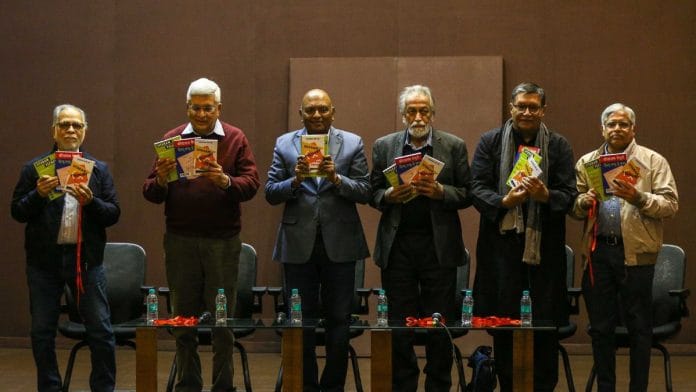New Delhi: Sitaram Yechury is remembered as the leading light of the Left, but few are aware of his deep passion for science and music.
“He believed music was more than melody; it was a force of resistance,” said economist Prabhat Patnaik on Friday at the launch of three books of the CPI(M) leader’s writings at Jawahar Bhawan. From Harry Belafonte to Michael Jackson and Shiva Tandava, Yechury found connections in music and art.
It was a gathering of friends, professors, comrades and students to celebrate the life and legacy of Yechury who died on 12 September 2024.
“Sitaram combined theory and practice in a way few could. He never wavered from his principles, even when the path was difficult,” said Prakash Karat, former General Secretary of the CPI(M) and a long-time comrade of Yechury, who released the books. All three works—Hindu Rashtra Hai Kya, Yechury’s writings: Reflections on Culture, Media, and Science and The Fight for the Republic were published by Safdar Hashmi Memorial Trust (SAHMAT) and Tulika Books.
The other speakers included Yechury’s classmate at JNU and retired professor of economics CP Chandrasekhar, Supreme Court advocate Raju Ramachandran, photographer and trustee of SAHMAT Ram Rahman and editor of CPI(M)’s Hindi weekly Rajendra Sharma.
But a few women from SAHMAT observed an absence that they were quick to point out.
“There are no women panellists on the stage, there are so many women who can speak about him but they chose all men,” said one of the women in the audience, as others nodded in agreement.
Also read: I am a Brahmin, my wife a Chishti & a Mysorean Rajput. Our son is an Indian: Sitaram Yechury
The early days
Raju Ramachandran, who traces his friendship with Yechury back to their days at St. Stephen’s College, recalled their student years.
“The year we joined, St. Stephen’s was a bastion of the posh schools of India—Doon, Mayo, St. Columba’s,” he said. And then there was Yechury from Government Higher Secondary School No. 6, President’s Estate.
“We outliers became friends because the others already knew each other,” Ramachandran said with a laugh. It was a friendship that spanned decades. “He lost six months to an exchange scholarship in the US, but he still managed to top the class. I gave him my notes—I got a second, and he got a first.”
Yechury’s deep love for music was a theme in the tributes. Ramachandran spoke about how Yechury often used to sing RD Burman’s Kuch Toh Log Kahenge, which encapsulated his philosophy of standing firm in the face of criticism.
Later, Patnaik recalled Yechury’s instinct to connect art with activism, music with resistance.
“He often quoted [activist, actor and singer] Paul Robeson, calling artists ‘the gatekeepers of truth’,” said Patnaik. In 2023, Ramachandran and Yechury attended a memorial concert honouring another African American singer and actor, Harry Belafonte. There, too, Yechury linked Belafonte’s activism to Robeson’s legacy.
“Yechury spoke so beautifully about how music inspires movements, about how Belafonte drew from Robeson and left a legacy for all progressives worldwide,” said Ramachandran.
Also read: Sitaram Yechury was Bengal’s undeclared ambassador, always fought against communalism—Md Salim
Lifelong commitment to ideals
All the speakers remembered Yechury’s ability to defend his ideology with clarity and conviction. Karat recalled his eloquent takedown of Hindutva ideologues. “His essay, What is Hindu Rashtra?, remains one of the most incisive critiques of Hindutva, outlining its historical and ideological contradictions,” he said.
Yechury’s intellectual range extended far beyond politics. Ramachandran shared excerpts from a column where Yechury contrasted Indian classical music’s timeless beauty with Michael Jackson’s cultural dynamism.
“Ali Akbar Khan’s music evokes irrepressible emotions, elevating our sense of being. Michael Jackson, on the other hand, epitomized a dynamic generation’s spirit, transforming how we experience music—from mere hearing to visualizing,” Yechury wrote.
Patnaik also touched on Sitaram Yechury’s atheism, “He was unwavering in his belief that human agency, not divine intervention, is what shapes history and society.”
Yechury’s rationalist worldview and commitment to progressive ideals didn’t stop him from studying religion.
“He could seamlessly connect the dialectics of Shiva’s Tandav to the philosophical unity of opposites,” Ramachandran added.
In his heartfelt speech, Ramachandran summed up everyone’s thoughts: “Sitaram was a genius, a polymath. The likes of him, we will never see again.”
(Edited by Theres Sudeep)






